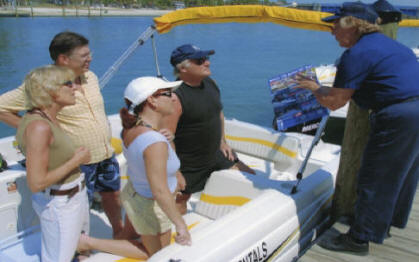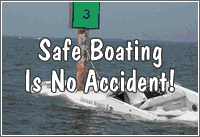
Vessel Safety Checks

The U. S. Coast Guard Auxiliary offers free boat safety checks to boaters who wish to be sure their boats meet all current federal and Maine state safety requirements. Vessel Safety Checks (VSCs) are performed on recreational powerboats and sailboats under 65 feet, personal watercraft (PWCs), and Paddlecraft (with particular emphasis on kayaks.)
The Vessel Examiners (VEs) who perform these checks are specially trained U.S. Coast Guard-approved Auxiliarists who are kept informed of the latest legal requirements for boaters. While VEs have no legal authority, our goal is to ensure the safety of all on board and of other boaters where you operate. We do this through an equipment review and discussions to enhance your personal knowledge of the latest U.S. Coast Guard and state required and recommended safety equipment and operating responsibilities. We even discuss how you can help us by reporting potential environmental or operational hazards or suspicious activity.
A Vessel Safety Check (VSC) is done at no charge and there’s no penalty if your boat’s equipment fails a VSC. Our VEs are happy to do a follow-up VSC once you’ve amended the cause(s) of failure. A current VSC sticker helps prevent you from getting equipment-related citations, greatly reduces the chance of you having a safety-related accident, signals others that you are a responsible boater, and may lead to a reduced boater insurance premium.
Click here to view what will be checked and discussed in having a Vessel Safety check for Power Boats, Sailboats and PWC's done.
Click here to view what will be checked and discussed in having a Paddle Craft Vessel Safety Check done.
The Bottom Line: You and your boat are better equipped for what truly matters when you’re out on the water: Fun and Safety!
Click here to request your FREE Vessel Safety Check for Greater Portland, ME and nearby surrounding communities.
Click here for a schedule of where we will be doing Vessel Safety Checks.
To request a FREE Vessel Safety Check for for areas outside of the Greater Portland, ME and nearby surrounding communities or other states click here.
![]()
![]()
Vessel Identification Stickers for Canoe, Kayak, Rowboat or Paddle Boards

For more information and to request a sticker please click here. This is a PDF 5 slide presentation. Last slide has order information.
![]()

"Show me a better reason to wear a life jacket!"
![]()
Safe Boating Tips And Help Items
Always file a Float Plan before going boating. More information is available at this link Float Plan Central.
![]()
State of Maine and Federal Accident reporting forms
Click Here for STATE OF MAINE SNOWMOBILE, ATV, WATERCRAFT ACCIDENT REPORT FORM
Click Here for Coast Guard Recreational Accident Reporting Form With Interactive Form Fields
![]()
Pre-Departure Check List for Boaters
Float plan - let a friend know when you're leaving, where you're going, when you expect to return, what to do if you don't, and a description of your boat.
Personal Flotation Devices (PFD's)
At least one Coast Guard approved device per passenger and a minimum of two onboard. An additional throwable device is required if the vessel is more than 16 feet long. Explain the location and use of all PFD's to passengers and crew that may be new to the vessel.
Sound Producing Devices (Whistle)
Must have a horn capable of producing a four-second blast audible for at least 1/2 mile. If a portable air horn, have a spare can of air or an alternate device.
Lights and Shapes
All navigation lights, as required, in working order. Instrumental lights working. If you intend to engage in an activity that requires a day shape, have the required shapes. Flashlight onboard.
Distress Signals
Accessible flares, day signals, etc., stored in a dry location. Carry signals at all times even if not required by the Coast Guard. Inform the crew and passengers of their location and their use.
Tools and Spares
Basic tool box onboard and a bucket for bailing. Box of spares aboard, e.g. fuel filter, light bulbs, head parts, through-hull plugs, etc.
Ventilation
On any powered vessel or auxiliary powered sailboat, or vessels using LPG for cooking or heat, check that all interior spaces are well ventilated before departure. If fuel smells are detected before ventilating, check after running the blowers for several minutes before starting. If odor persists, look for the source.
Fire Extinguishers
Accessible fire extinguisher. Do you have at least those required by the U.S.C.G.? Check to be sure mounts are secure and functional before departure.
Fuel and Oil
Are your tanks topped-off? If not, have enough fuel to provide a reasonable margin of safety for your return. Check the engine oil and coolant level.
Make sure to carry oars or paddles. In some states it is a requirement.
Bilges
Check to be sure bilges are reasonably dry and that pumps are not running excessively. Clean up any spilled oil or waste in bilges to prevent overboard discharge.
Battery Care
If you have a dual charging system, is the selector switch in the proper position? Is the power on to the entire vessel? Spare batteries for accessories such as a hand-held radio, flashlight, portable navigational aid, etc. If they are rechargeable, are they charged?
Weather Forecast
Did you check the weather forecast? Radio onboard to receive weather updates.
Docking and Anchoring
At least one anchor set up and bent-on to your anchor line. Two or three extra docklines in case of unusual conditions dockside. Visually inspect the lines you use for chafe or wear. At least two fenders onboard for docking or towing if required.
Documentation
Have the ship's papers, registration, radio license, license or boating safety course I.D., fishing permit, etc. onboard. Have the chart or charts for the area you intend to cruise in, regardless of your level of local knowledge.
Boating Offshore - EXPIRE and Life raft
Trailer Boating
Before leaving home: Is the battery charged? Do you have the keys to the boat? Is the plug in the boat?
Trailer Checks
Check tire pressure and grease wheel bearings. Make sure hitch is secure and safety chains attached. Make sure boat is tied down properly.
LOOK BEFORE BACKING UP.
Sailing Vessels
Check sails, lines, sheets and rigging. Don't forget the tiller and centerboard. WATCH FOR OVERHEAD POWER LINES when raising the mast.
Acquaint all passengers with use and location of safety equipment, radio, docking & undocking plans, etc.
![]()

Casco Bay Flotilla 2-1
Schedule A Free
Vessel Safety Check Portland, Maine Area
